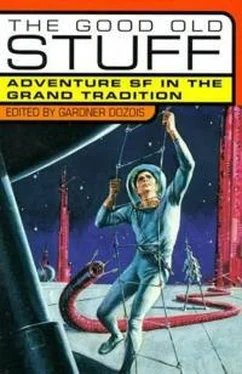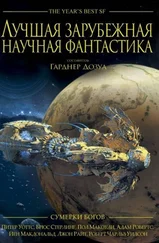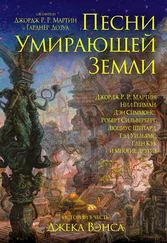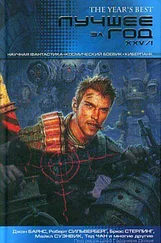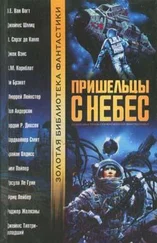Гарднер Дозуа - The Good Old Stuff
Здесь есть возможность читать онлайн «Гарднер Дозуа - The Good Old Stuff» весь текст электронной книги совершенно бесплатно (целиком полную версию без сокращений). В некоторых случаях можно слушать аудио, скачать через торрент в формате fb2 и присутствует краткое содержание. Год выпуска: 1998, ISBN: 1998, Издательство: St. Martin's Griffin, Жанр: Фантастика и фэнтези, на английском языке. Описание произведения, (предисловие) а так же отзывы посетителей доступны на портале библиотеки ЛибКат.
- Название:The Good Old Stuff
- Автор:
- Издательство:St. Martin's Griffin
- Жанр:
- Год:1998
- ISBN:0-312-19275-4
- Рейтинг книги:3 / 5. Голосов: 1
-
Избранное:Добавить в избранное
- Отзывы:
-
Ваша оценка:
- 60
- 1
- 2
- 3
- 4
- 5
The Good Old Stuff: краткое содержание, описание и аннотация
Предлагаем к чтению аннотацию, описание, краткое содержание или предисловие (зависит от того, что написал сам автор книги «The Good Old Stuff»). Если вы не нашли необходимую информацию о книге — напишите в комментариях, мы постараемся отыскать её.
The Good Old Stuff — читать онлайн бесплатно полную книгу (весь текст) целиком
Ниже представлен текст книги, разбитый по страницам. Система сохранения места последней прочитанной страницы, позволяет с удобством читать онлайн бесплатно книгу «The Good Old Stuff», без необходимости каждый раз заново искать на чём Вы остановились. Поставьте закладку, и сможете в любой момент перейти на страницу, на которой закончили чтение.
Интервал:
Закладка:
“John Ross.”
“JonRoss,” she repeated and smiled. She began to walk around me, touching my hair, inspecting my arms and chest, taking a child’s delight in discovering all the differences there were between herself and what we call a human. And that was the beginning of my captivity.
There were days and nights, scant food and scanter water. There was Duani. And there was Shandakor. I lost my fear. And whether I lived to occupy the Chair or not, this was something to have seen.
Duani was my guide. I was tender of my duties because my neck depended on them but there was time to wander in the streets, to watch the crowded pageant that was not and sense the stillness and the desolation that were so cruelly real.
I began to get the feel of what this alien culture had been like and how it had dominated half a world without the need of conquest. In a Hall of Government, built of white marble and decorated with wall friezes of austere magnificence, I watched the careful choosing and the crowning of a king. I saw the places of learning. I saw the young men trained for war as fully as they were instructed in the arts of peace.
I saw the pleasure gardens, the theaters, the forums, the sporting fields—and I saw the places of work, where the men and women of Shandakor coaxed beauty from their looms and forges to trade for the things they wanted from the human world. The human slaves were brought by their own kind to be sold, and they seemed to be well treated, as one treats a useful animal in which one has invested money. They had their work to do but it was only a small part of the work of the city.
The things that could he had nowhere else on Mars—the tools, the textiles, the fine work in metal and precious stones, the glass and porcelain—were fashioned by the people of Shandakor and they were proud of their skill. Their scientific knowledge they kept entirely to themselves, except what concerned agriculture or medicine or better ways of building drains and houses.
They were the lawgivers, the teachers. And the humans took all they would give and hated them for it. How long it had taken these people to attain such a degree of civilization Duani could not tell me.
Neither could old Rhnl.
“It is certain that we lived in communities, had a form of civil government, a system of numbers and written speech, before the human tribes. There are traditions of an earlier race than ours, from whom we learned these things. Whether or not this is true I do not know.”
In its prime Shandakor had been a vast and flourishing city with countless thousands of inhabitants. Yet I could see no signs of poverty or crime. I couldn’t even find a prison.
“Murder was punishable by death,” said Rhul, “but it was most infrequent. Theft was for slaves. We did not stoop to it.” He watched my face, smiling a little acid smile. “That startles you—a great city without suffering or crime or places of punishment.”
I had to admit that it did. “Elder race or not, how did you manage to do it? I’m a student of cultures, both here and on my own world. I know all the usual patterns of development and I’ve read all the theories about them—but Shandakor doesn’t fit any of them.”
Rhul’s smile deepened. “You are human,” he said. “Do you wish the truth?”
“Of course.”
“Then I will tell you. We developed the faculty of reason.”
For a moment I thought he was joking. “Come,” I said, “man is a reasoning being—on Earth the only reasoning being.”
“I do not know of Earth,” he answered courteously. “But on Mars man has always said, ‘I reason, I am above the beasts because I reason.’ And he has been very proud of himself because he could reason. It is the mark of his humanity. Being convinced that reason operates automatically within him he orders his life and his government upon emotion and superstition.
“He hates and fears and believes, not with reason but because he is told to by other men or by tradition. He does one thing and says another and his reason teaches him no difference between fact and falsehood. His bloodiest wars are fought for the merest whim—and that is why we did not give him weapons. His greatest follies appear to him the highest wisdom, his basest betrayals become noble acts—and that is why we could not teach him justice. We learned to reason. Man only learned to talk.”
I understood then why the human tribes had hated the men of Shandakor.
I said angrily, “Perhaps that is so on Mars. But only reasoning minds can develop great technologies and we humans of Earth have outstripped yours a million times. All right, you know or knew some things we haven’t learned yet, in optics and some branches of electronics and perhaps in metallurgy. But ...”
I went on to tell him all the things we had that Shandakor did not.
“You never went beyond the beast of burden and the simple wheel. We achieved flight long ago. We have conquered space and the planets. We’ll go on to conquer the stars!”
Rhul nodded. “Perhaps we were wrong. We remained here and conquered ourselves.” He looked out toward the slopes where the barbarian army waited and he sighed. “In the end it is all the same.”
Days and nights and Duani, bringing me food, sharing her water, asking questions, taking me through the city. The only thing she would not show me was something they called the Place of Sleep. “I shall be there soon enough,” she said and shivered.
“How long?” I asked. It was an ugly thing to say.
“We are not told. Rhul watches the level in the cisterns and when it’s time ...” She made a gesture with her hands. “Let us go up on the wall.”
We went up among the ghostly soldiery and the phantom banners. Outside there were darkness and death and the coming of death. Inside there were light and beauty, the last proud blaze of Shandakor under the shadow of its doom. There was an eerie magic in it that had begun to tell on me. I watched Duani. She leaned against the parapet, looking outward. The wind ruffled her silver crest, pressed her garments close against her body. Her eyes were full of moonlight and I could not read them. Then I saw that there were tears.
I put my arm around her shoulders. She was only a child, an alien child, not of my race or breed ...
“JonRoss.”
“Yes?”
“There are so many things I will never know.”
It was the first time I had touched her. Those curious curls stirred under my fingers, warm and alive. The tips of her pointed ears were soft as a kitten’s.
“Duani.”
“What?”
“I don’t know ...”
I kissed her. She drew back and gave me a startled look from those black brilliant eyes and suddenly I stopped thinking that she was a child and I forgot that she was not human and—I didn’t care.
“Duani, listen. You don’t have to go to the Place of Sleep.” She looked at me, her cloak spread out upon the night wind, her hands against my chest.
“There’s a whole world out there to live in. And if you aren’t happy there I’ll take you to my world, to Earth. There isn’t any reason why you have to die!” Still she looked at me and did not speak. In the streets below the silent throngs went by and the towers glowed with many colors. Duani’s gaze moved slowly to the darkness beyond the wall, to the barren valley and the hostile rocks.
“No.”
“Why not? Because of Rhul, because of all this talk of pride and race?”
“Because of truth. Conn learned it.”
I didn’t want to think about Conn. “He was alone. You’re not. You’d never be alone.”
She brought her hands up and laid them on my cheeks very gently. “That green star, that is your world. Suppose it were to vanish and you were the last of all the men of Earth. Suppose you lived with me in Shandakor forever—would you not be alone?”
Читать дальшеИнтервал:
Закладка:
Похожие книги на «The Good Old Stuff»
Представляем Вашему вниманию похожие книги на «The Good Old Stuff» списком для выбора. Мы отобрали схожую по названию и смыслу литературу в надежде предоставить читателям больше вариантов отыскать новые, интересные, ещё непрочитанные произведения.
Обсуждение, отзывы о книге «The Good Old Stuff» и просто собственные мнения читателей. Оставьте ваши комментарии, напишите, что Вы думаете о произведении, его смысле или главных героях. Укажите что конкретно понравилось, а что нет, и почему Вы так считаете.
